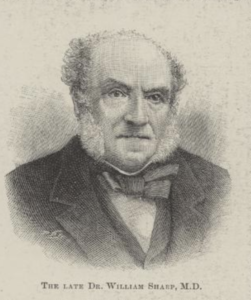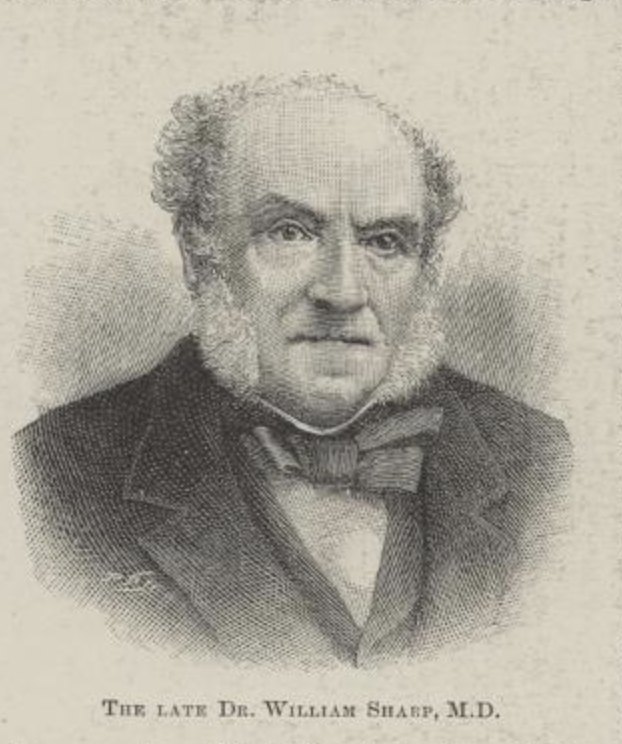
Dr. William Sharp. Image Credit: original source unknown
William Sharp M.D. F.R.S. (21 January 1805 – 10 April 1896) was an orthodox physician, Senior Surgeon to the Bradford Infirmary, who converted to homeopathy to become President of the Midland Homeopathic Society and a member of the Northern Homeopathic Medical Association.
William Sharp was born in Armley near Leeds, Yorkshire, in January 1805 to merchant Richard Sharp (1771 – 1853) and his wife Mary Turton (1771 – 1836).
William Sharp was educated at Wakefield Grammar and Westminster Schools. In 1821 he began studying medicine with his uncle, William Sharp (1766 – 1833), a noted Bradford surgeon, and moved to London where he commenced medical education at Guys and St. Thomas’ Hospitals.
In 1826, William Sharp received his licence to practice from the Society of Apothecaries and in 1827 he obtained a diploma from the Royal College of Surgeons. That year he completed his studies in Paris before returning to England where he began practice in Bradford.
In 1829, William Sharp was appointed surgeon to the new Bradford Infirmary, and in 1837 he was made senior surgeon.
In 1833, William Sharp married Anne Hailstone (1811 – 1834) in her home town of Bradford. They had one daughter, Anne (1834 – 1846), but Sharp’s wife Anne died just two days after giving birth, on 5 August 1834.
In March 1836, William Sharp married Emma Scott (1815 – 1899), daughter of John Scott, vicar of St Mary’s in Hull. They had twelve children: Reverend John Sharp (1837 – 1917), Mary (1838 – 1850), William (1840 – 1840), William (1841 – 1842), Emma Frances (1843 – 1875), Reverend William Hey Sharp (1845 – 1928), Thomas Scott (1847 – 1848), Granville (1849 – 1931), Jane (1850 – 1850), Arthur (1851 – 1852), Ellen Susan (1854 – 1855), and Amelia (1856 – 1939).
After seven years at Bradford Infirmary, in 1843 William Sharp resigned and relocated to Hull, where he lectured on scientific subjects for the next four years.
In 1847, Sharp moved again to Rugby to be near his sons who were enrolled at the school. While in Bradford Sharp had founded and served as the first President of the town’s Philosophical Society. In 1839 he had delivered a paper on the importance of local museums. The consequence of this was the creation of local museums across the country and in 1840 Sharp was made a fellow of the Royal Society.
Following Sharp’s urging for physical science to be taught in schools, in 1849 Rugby headmaster Dr. (later, Archbishop) Tait invited Sharp to become the very first reader in Natural Philosophy at the school, a position he held until he resigned in 1850 to resume his scientific and medical research.
At the suggestion of a colleague, Dr John Hodgson Ramsbotham in Leeds, William Sharp began investigating homeopathy. He quickly determined that homeopathy was the most rational and effective system and published dozens of tracts on the subject, beginning in 1852 and later collected in Tracts on Homeopathy.
Another colleague of Sharp’s was Leamington-based homeopathic physician Dr. John Stuart Sutherland, who consulted Sharp in 1851 over a problematic case of a Warwick woman suffering from calculus of the urinary tract. After Sharp successfully removed the stone he prescribed Arnica to aid her recovery, noting the efficacy of the remedy when the patient had been returned to Sutherland’s oversight.
In 1856, The Archbishop of Canterbury conferred on William Sharp the degree of M.D.
William Sharp lived at Horton House in Rugby in 1861.
On the evening of Thursday 15 June, 1865, William Sharp, was one of a group of medical men who met at the Stork Hotel in Birmingham to form a new association, the Midland Homoeopathic Medical Society. Sharp was elected a member of the committee tasked with drawing up the rules of the new society, along with James Smith Ayerst, James Gibbs Blake, John Hitchman, George Moore, Henry Robertson, John Stuart Sutherland, and Edward Wynne Thomas. He would remain a committee member, and later served as President of the Society.
In September 1873 William Sharp was President of the fourth British Homoeopathic Congress held that year in Leamington. He was a member of the Congress Executive Committee, alongside Doctors Francis Black, Collins, John James Drysdale, James Gibbs Blake, W. Thomas, and surgeon Fraser Evans. However, Sharp’s Presidential Address, entitled “The Kind of Action of Drugs. The Action of Small Doses. A Law for the Dose,” was not well-received in the homeopathic press as Sharp endeavored to find a synthesis between the irreconcilable homeopathic and allopathic therapeutic approaches.
William Sharp retired from medical practice in 1877, but continued his scientific research and writing. He died, aged 91, while visiting the Welsh coastal resort of Llandudno in April 1896, and was laid to rest in Saint Hilary’s Church, Llanrhos.
William Sharp’s Obituary is in The Homeopathic World in 1896.
In its entry for William Sharp, The Dictionary of National Biography (Vol. 51) concluded that while “the value of his medical researches remains for future estimate:”
Sharp’s claim to recognition rests on his practical suggestions for encouraging the study of natural science. It is owing to his initiative that every public school in England now has its science teacher, and every towns its local museum.
William Sharp (1805–1896) “… was an English surgeon and physician. Sharp is credited with first advocating the establishment of local museums in Britain and for putting science on the curricula of British public schools. He was the first science teacher in a British public school and an early advocate of homoeopathy.
Sharp was born at Armley, which is now part of Leeds in Yorkshire, on 21 January 1805 to Richard and Mary (born Turton) Sharp. His father was a merchant who already had two sons and two daughters. The Sharp family was notable in Yorkshire, and its members included his grandfather, John Sharp who had been an Archbishop of Canterbury, and Abraham Sharp a mathematician and astronomer.
Bradford Royal Infirmary
William’s education was initially undertaken by his uncle at Wakefield Grammar School until he joined Westminster School in 1817. He learnt to be a surgeon from another uncle (also William) who lived in William’s home town, and then in Leeds with William Hey. He completed his training in surgery at Borough hospitals in London and became a qualified surgeon in 1827. After a brief period working in Paris, he rejoined his uncle and took over his business in 1833. He worked for the Bradford Infirmary and became its senior surgeon in 1837 although he was still interested in science in general. He re-established the Bradford Philosophical Society and in 1840 was elected a fellow of the Royal Society after reading a paper to the Birmingham meeting of the British Association. He had proposed that local museums should be established in each town across the country.
Sharp lived and worked in Hull for four years before ending up in Rugby so that his sons could attend Rugby School. He continued to advocate the importance of science, and the school added this subject to its curriculum. He was briefly employed by Rugby School as the first science teacher in a public school. Sharp resigned in 1850 to return to medicine and research.
Sharp became interested in homoeopathy, and over the next forty years he published over 60 papers dealing with this subject which he believed central to combining other more conventional approaches to medicine. His tracts on homeopathy went through several editions. Sharp’s papers were not always well received. Unlike most homoeopaths he believed in antipraxy which proposes that some drugs may have totally different results at different doses.
Sharp died at Llandudno in 1896 and is buried at Llanrhos on the Welsh coast…’
Select Publications:
- The Truth of Homeopathy (1852)
- What is Homeopathy? (1852)
- The Advantages of Homeopathy (1853)
- The Controversy on Homeopathy (1853)
- The Defence of Homeopathy (1853)
- The Difficulties of Homeopathy (1853)
- The Principle of Homeopathy (1853)
- The Remedies of Homeopathy (1853)
- The Small Dose of Homeopathy (1853)
- The Common Sense of Homeopathy (1854)
- The Single Medicine of Homeopathy (1854)
- An Investigation of Homeopathy (1856)
- A Letter to Sir Benjamin Brodie (1861)
- The Physiological Action of Medicines (1866)
- Organopathy, or Medical Progress – An Essay (1867)
- Essays on Medicine (1874)
- The Actions of One Dose (1877)
- Therapeutics, Founded upon Organopathy and Antipraxy (1886)




Leave A Comment